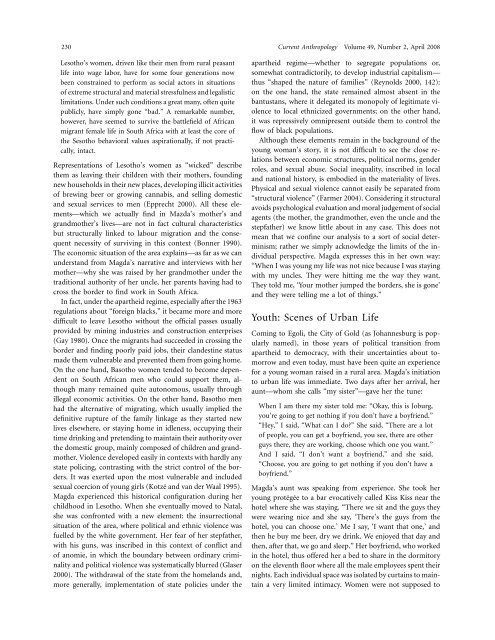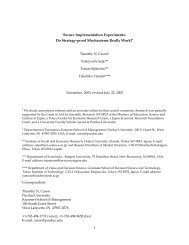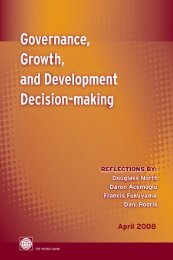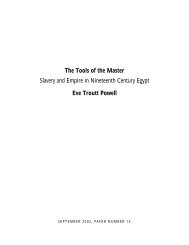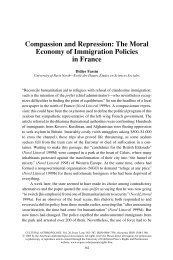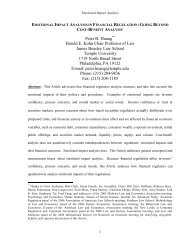Life & Times of Magda A: Telling a Story of Violence in South Africa
Life & Times of Magda A: Telling a Story of Violence in South Africa
Life & Times of Magda A: Telling a Story of Violence in South Africa
You also want an ePaper? Increase the reach of your titles
YUMPU automatically turns print PDFs into web optimized ePapers that Google loves.
230 Current Anthropology Volume 49, Number 2, April 2008<br />
Lesotho’s women, driven like their men from rural peasant<br />
life <strong>in</strong>to wage labor, have for some four generations now<br />
been constra<strong>in</strong>ed to perform as social actors <strong>in</strong> situations<br />
<strong>of</strong> extreme structural and material stressfulness and legalistic<br />
limitations. Under such conditions a great many, <strong>of</strong>ten quite<br />
publicly, have simply gone “bad.” A remarkable number,<br />
however, have seemed to survive the battlefield <strong>of</strong> <strong>Africa</strong>n<br />
migrant female life <strong>in</strong> <strong>South</strong> <strong>Africa</strong> with at least the core <strong>of</strong><br />
the Sesotho behavioral values aspirationally, if not practically,<br />
<strong>in</strong>tact.<br />
Representations <strong>of</strong> Lesotho’s women as “wicked” describe<br />
them as leav<strong>in</strong>g their children with their mothers, found<strong>in</strong>g<br />
new households <strong>in</strong> their new places, develop<strong>in</strong>g illicit activities<br />
<strong>of</strong> brew<strong>in</strong>g beer or grow<strong>in</strong>g cannabis, and sell<strong>in</strong>g domestic<br />
and sexual services to men (Epprecht 2000). All these elements—which<br />
we actually f<strong>in</strong>d <strong>in</strong> Mazda’s mother’s and<br />
grandmother’s lives—are not <strong>in</strong> fact cultural characteristics<br />
but structurally l<strong>in</strong>ked to labour migration and the consequent<br />
necessity <strong>of</strong> surviv<strong>in</strong>g <strong>in</strong> this context (Bonner 1990).<br />
The economic situation <strong>of</strong> the area expla<strong>in</strong>s—as far as we can<br />
understand from <strong>Magda</strong>’s narrative and <strong>in</strong>terviews with her<br />
mother—why she was raised by her grandmother under the<br />
traditional authority <strong>of</strong> her uncle, her parents hav<strong>in</strong>g had to<br />
cross the border to f<strong>in</strong>d work <strong>in</strong> <strong>South</strong> <strong>Africa</strong>.<br />
In fact, under the apartheid regime, especially after the 1963<br />
regulations about “foreign blacks,” it became more and more<br />
difficult to leave Lesotho without the <strong>of</strong>ficial passes usually<br />
provided by m<strong>in</strong><strong>in</strong>g <strong>in</strong>dustries and construction enterprises<br />
(Gay 1980). Once the migrants had succeeded <strong>in</strong> cross<strong>in</strong>g the<br />
border and f<strong>in</strong>d<strong>in</strong>g poorly paid jobs, their clandest<strong>in</strong>e status<br />
made them vulnerable and prevented them from go<strong>in</strong>g home.<br />
On the one hand, Basotho women tended to become dependent<br />
on <strong>South</strong> <strong>Africa</strong>n men who could support them, although<br />
many rema<strong>in</strong>ed quite autonomous, usually through<br />
illegal economic activities. On the other hand, Basotho men<br />
had the alternative <strong>of</strong> migrat<strong>in</strong>g, which usually implied the<br />
def<strong>in</strong>itive rupture <strong>of</strong> the family l<strong>in</strong>kage as they started new<br />
lives elsewhere, or stay<strong>in</strong>g home <strong>in</strong> idleness, occupy<strong>in</strong>g their<br />
time dr<strong>in</strong>k<strong>in</strong>g and pretend<strong>in</strong>g to ma<strong>in</strong>ta<strong>in</strong> their authority over<br />
the domestic group, ma<strong>in</strong>ly composed <strong>of</strong> children and grandmother.<br />
<strong>Violence</strong> developed easily <strong>in</strong> contexts with hardly any<br />
state polic<strong>in</strong>g, contrast<strong>in</strong>g with the strict control <strong>of</strong> the borders.<br />
It was exerted upon the most vulnerable and <strong>in</strong>cluded<br />
sexual coercion <strong>of</strong> young girls (Kotzé and van der Waal 1995).<br />
<strong>Magda</strong> experienced this historical configuration dur<strong>in</strong>g her<br />
childhood <strong>in</strong> Lesotho. When she eventually moved to Natal,<br />
she was confronted with a new element: the <strong>in</strong>surrectional<br />
situation <strong>of</strong> the area, where political and ethnic violence was<br />
fuelled by the white government. Her fear <strong>of</strong> her stepfather,<br />
with his guns, was <strong>in</strong>scribed <strong>in</strong> this context <strong>of</strong> conflict and<br />
<strong>of</strong> anomie, <strong>in</strong> which the boundary between ord<strong>in</strong>ary crim<strong>in</strong>ality<br />
and political violence was systematically blurred (Glaser<br />
2000). The withdrawal <strong>of</strong> the state from the homelands and,<br />
more generally, implementation <strong>of</strong> state policies under the<br />
apartheid regime—whether to segregate populations or,<br />
somewhat contradictorily, to develop <strong>in</strong>dustrial capitalism—<br />
thus “shaped the nature <strong>of</strong> families” (Reynolds 2000, 142):<br />
on the one hand, the state rema<strong>in</strong>ed almost absent <strong>in</strong> the<br />
bantustans, where it delegated its monopoly <strong>of</strong> legitimate violence<br />
to local ethnicized governments; on the other hand,<br />
it was repressively omnipresent outside them to control the<br />
flow <strong>of</strong> black populations.<br />
Although these elements rema<strong>in</strong> <strong>in</strong> the background <strong>of</strong> the<br />
young woman’s story, it is not difficult to see the close relations<br />
between economic structures, political norms, gender<br />
roles, and sexual abuse. Social <strong>in</strong>equality, <strong>in</strong>scribed <strong>in</strong> local<br />
and national history, is embodied <strong>in</strong> the materiality <strong>of</strong> lives.<br />
Physical and sexual violence cannot easily be separated from<br />
“structural violence” (Farmer 2004). Consider<strong>in</strong>g it structural<br />
avoids psychological evaluation and moral judgement <strong>of</strong> social<br />
agents (the mother, the grandmother, even the uncle and the<br />
stepfather) we know little about <strong>in</strong> any case. This does not<br />
mean that we conf<strong>in</strong>e our analysis to a sort <strong>of</strong> social determ<strong>in</strong>ism;<br />
rather we simply acknowledge the limits <strong>of</strong> the <strong>in</strong>dividual<br />
perspective. <strong>Magda</strong> expresses this <strong>in</strong> her own way:<br />
“When I was young my life was not nice because I was stay<strong>in</strong>g<br />
with my uncles. They were hitt<strong>in</strong>g me the way they want.<br />
They told me, ‘Your mother jumped the borders, she is gone’<br />
and they were tell<strong>in</strong>g me a lot <strong>of</strong> th<strong>in</strong>gs.”<br />
Youth: Scenes <strong>of</strong> Urban <strong>Life</strong><br />
Com<strong>in</strong>g to Egoli, the City <strong>of</strong> Gold (as Johannesburg is popularly<br />
named), <strong>in</strong> those years <strong>of</strong> political transition from<br />
apartheid to democracy, with their uncerta<strong>in</strong>ties about tomorrow<br />
and even today, must have been quite an experience<br />
for a young woman raised <strong>in</strong> a rural area. <strong>Magda</strong>’s <strong>in</strong>itiation<br />
to urban life was immediate. Two days after her arrival, her<br />
aunt—whom she calls “my sister”—gave her the tune:<br />
When I am there my sister told me: “Okay, this is Joburg,<br />
you’re go<strong>in</strong>g to get noth<strong>in</strong>g if you don’t have a boyfriend.”<br />
“Hey,” I said, “What can I do?” She said, “There are a lot<br />
<strong>of</strong> people, you can get a boyfriend, you see, there are other<br />
guys there, they are work<strong>in</strong>g, choose which one you want.”<br />
And I said, “I don’t want a boyfriend,” and she said,<br />
“Choose, you are go<strong>in</strong>g to get noth<strong>in</strong>g if you don’t have a<br />
boyfriend.”<br />
<strong>Magda</strong>’s aunt was speak<strong>in</strong>g from experience. She took her<br />
young protégée to a bar evocatively called Kiss Kiss near the<br />
hotel where she was stay<strong>in</strong>g. “There we sit and the guys they<br />
were wear<strong>in</strong>g nice and she say, ‘There’s the guys from the<br />
hotel, you can choose one.’ Me I say, ‘I want that one,’ and<br />
then he buy me beer, dry we dr<strong>in</strong>k. We enjoyed that day and<br />
then, after that, we go and sleep.” Her boyfriend, who worked<br />
<strong>in</strong> the hotel, thus <strong>of</strong>fered her a bed to share <strong>in</strong> the dormitory<br />
on the eleventh floor where all the male employees spent their<br />
nights. Each <strong>in</strong>dividual space was isolated by curta<strong>in</strong>s to ma<strong>in</strong>ta<strong>in</strong><br />
a very limited <strong>in</strong>timacy. Women were not supposed to


